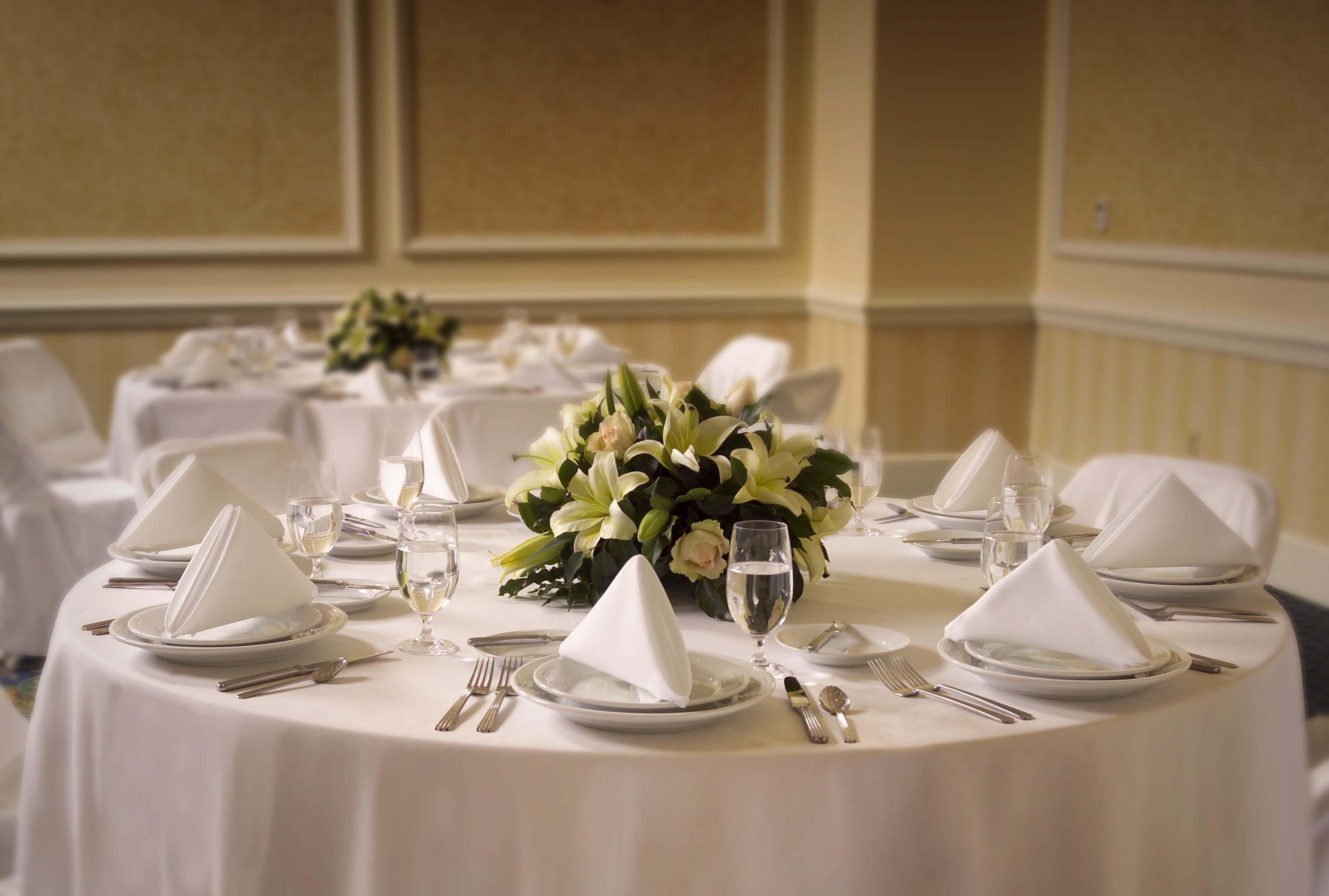
Banquet tablecloths are large sections of fabric that are used in order to cover tables at formal events, such as weddings, conferences, anniversary parties, and awards ceremonies. They serve both a practical and aesthetic purpose, helping to protect the surface of the table while simultaneously enhancing the elegance and appearance of the event in general.
Banquet tablecloths are available in several different styles, sizes, materials, colors, and patterns. This allows event organizers to create visually appealing table settings that complement the occasion’s theme and overall style.
Important Characteristics to Consider About Banquet Tablecloths
Banquet tablecloths are essential for creating an aesthetically pleasing, and cohesive table setting for formal events, in addition to providing practical benefits like protecting the surface of the table and making the cleanup process much easier. In addition to their visual appeal, banquet tablecloths protect table surfaces from spills, stains, denting, and scratches. They also make clean up exponentially easier since because you can simply fold up the banquet tablecloth and take most of the mess with it.
Tablecloths can extend a table’s life span, potentially saving you thousands of dollars down the road. You can also use less expensive tables if you know they will be covered by tablecloths.
There are some factors to consider when choosing the right banquet tablecloths for your business or event. Here are some banquet tablecloth characteristics to assess:
Materials
Banquet tablecloths are composed of a variety of materials, including polyester, cotton, linen, satin, or some combination of these fibers. The selection of the right material for you will primarily depend on the desired appearance you would like to portray, the preferred texture, and your budget. Polyester is popular in the food- service industry due to its durability, affordability, and resistance to wrinkles, whereas linen and cotton have a more natural and refined appearance.
Sizes
Banquet tablecloths are available in a variety of sizes to accommodate round, rectangular, and square tables (as well as alternative and less common designs). The tablecloth should be sized according to the dimensions of the table and the desired quantity of overhang that occurs from the edge of the table.
Colors, Shades & Patterns
Banquet tablecloths are available in a variety of colors, patterns, and textures, enabling event organizers to create a look that complements the event’s theme and general aesthetic. For added visual appeal, some tablecloths may feature decorative elements like embroidery, lace, or sequins.
Choosing the Right Tablecloth
You must consider several factors, including size, material, and color, must be considered when selecting banquet tablecloths in order to create an attractive and functional table setting that matches the event’s theme and aesthetic. Here are some tips that may help you in choosing banquet tablecloths:
Choose the Right Size Based on Your Needs
Determine the appropriate tablecloth measurement by calculating the length, width, and height of your table.
Determine the intended drop, or the length of the tablecloth that hangs over the edge of the table. For a casual look, a standard drop is approximately 6 to 12 inches, whereas a formal look may necessitate a drop to the floor or just a few inches above.
To determine the ideal dimensions of your tablecloth, multiply the length and width of the table by two times the desired length of the drop.
Make sure to also consider the seating arrangement and ensure that there is sufficient leg room under the table when determining the duration of the drop.
Choose the Best Material You Can Afford
Polyester is a popular option for banquet tablecloths due to its affordability, durability, and ability to not wrinkle. This material also requires little maintenance and is simple to clean. It is also available in a wide range of patterns and colors.
According to most people in the food-service industry, cotton and linen are natural materials that provide a more refined appearance than polyester. These materials are breathable and soft to the touch, although they may require more maintenance because they wrinkle and stain more easily than some other materials.
The more refined and elegant appearance of satin tablecloths can provide a very formal aesthetic to any event. However, this material tends to be more susceptible to showing stains and wrinkling. It is also more difficult to clean.
When selecting the material of a tablecloth, consider the events level of formality, your intended aesthetic, and any maintenance requirements.
Choose Your Preferred Color & Style
When selecting a tablecloth, choose a color that complements the theme, decor, and overall ambience of the event. You may prefer to choose neutral colors, such as white, ivory, or beige, for a classic, elegant appearance. Consider more vibrant colors to create a daring, and festive environment.
Also, consider matching the color of the tablecloth with other table elements, such as napkins, chair covers, and centerpieces, in order to create a more coordinated look. This can give a more polished look to the entire event.
Consider selecting a pattern or texture that complements the events theme without overwhelming the table setting if you favor patterns or textures. Keep in mind that a tablecloth with a dense pattern may not fully align with other table decorations, so assess all elements together. A solid-colored tablecloth can be layered with a patterned or textured overlay in order to add to the visual uniqueness of the table arrangement.
By carefully considering size, material, and color, you can choose banquet tablecloths that contribute to an aesthetically pleasing and functional table setting, thereby enhancing the events overall aesthetic and ambiance. Alsco offers the latest in banquet tablecloth supply, rental, and cleaning services at highly competitive prices. Contact us today to learn more about how we can help to elevate your event while simplifying the process for you.
References
The Best Napkins and Tablecloth. (December 2022). The New York Times.
